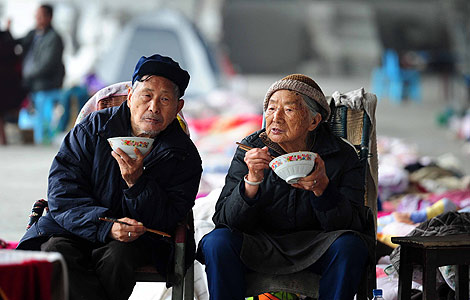Are cities expanding too fast and too soon?
Updated: 2013-04-23 08:07
By Xue Lan (China Daily)
|
||||||||
No haste
Harvard University initiated a plan for campus expansion 10 years ago, when Larry Summers was still its president. To construct new teaching and research buildings on the other side of the Charles River, the university went through several rounds of communication with faculty, students and local residents, and even set up an exhibition room to present its plan to the public.
But still, the construction may take another 10 years or longer before it can be accomplished. While Harvard was in the process of communication, hundreds of universities in China have established brand-new campuses and even university towns.
These hasty developments, while reflecting local government officials' eagerness to contribute to the modernization of our country, also reveal the limits of their terms of office. Every official wants to present a good record when their terms of office are over so as to lay the foundation for their next steps. The pace of urbanization, however, is not necessarily in step with the officials' terms.
As a result, quality problems, like those revealed in recent extreme weather in a lot of Chinese cities, are beginning to emerge. What's worse, the negative results are far from being fully discovered, as the cities' incumbent leaders are usually reluctant to expose anything negative about their predecessors, who are in most cases their current bosses.
A problem related to the change of officials is the change of policies. Very often in China, transitions of government officials also bring about transitions of ideas and policies. Although it is necessary for policies to evolve as society develops, changes, if too frequent, only suggest that the existing policies are not forward-looking enough.
In Charleston, South Carolina, the setting of Gone with the Wind, many historical buildings from the colonial era remain well preserved today, as Mayor Joseph Riley's life's pursuit is to protect the historical buildings and preserve the city's history and culture.
It's perhaps not a coincidence that he is one of the longest serving mayors that is still in office - he has served 10 terms starting from 1975. When I was invited to Charleston by the Board of the Brookings Institution, Riley was our luncheon speaker. With his soft southern accent and beautiful PowerPoint slides, he spoke on and on, for over an hour, long exceeding the appointed time, until the moderator had to stop him.
The next day, when the governor of South Carolina asked me about my impressions of Charleston, I mentioned Riley's presentation. Immediately the governor asked: "Did he finish it?" We both laughed. Behind Riley's unfinished presentation was his genuine love for the city and persistence in protecting it, which can be a great source of learning for Chinese officials.
To advance urbanization with good Chinese characteristics, the planning authorities should first learn to sort out priorities and make hard choices. Since we cannot do everything and do it well, we had better make choices in accordance with cities' advantages. Only by choosing priorities and continuing its development can a city distinguish itself.
The next thing to do is to slow down. It takes time for contemporary trends to become cultural assets, and for experience to become invaluable learning. It also takes time for problems and conflicts to be exposed, and then, to be resolved. Hasty development may do more harm than good to a city.
Sustainability needed
Vital importance should be attached to sustainability in China's urbanization drive - sustainability both in terms of the environment, and of the system. Environment deterioration is affecting not only major cities, but also many medium and small cities in China. If the nation's urbanization does not develop in a sustainable way, it could bring more problems and even disasters to future generations.
Meanwhile, sustainability in urban governance is also important. For example, not enough attention is paid to the public finance system. Without a healthy public finance system, urbanization will create more problems than it solves.
It is estimated that thousands of millions of rural residents will become urbanites in the decades to come. It is the mission of our generation to make hard choices, slow down our pace, and achieve sustainability, to ensure the healthy development of China's urbanization.
Xue Lan is also co-chair of the Urban China Initiative jointly led by the Tsinghua School of Public Policy and Management, Columbia University, and McKinsey & Company.

 Children gathered together as healing process begins
Children gathered together as healing process begins
 Fears surface after hippo kills tourist from Shanghai
Fears surface after hippo kills tourist from Shanghai
 Rescuers win people’s hearts
Rescuers win people’s hearts
 Law to curb tourism price hikes
Law to curb tourism price hikes
 House damaged, life continues in Sichuan
House damaged, life continues in Sichuan
 Relief reaches isolated village
Relief reaches isolated village
 Rainfall poses new threats to quake-hit region
Rainfall poses new threats to quake-hit region
 Funerals begin for Boston bombing victims
Funerals begin for Boston bombing victims
Most Viewed
Editor's Picks

|

|

|

|

|

|
Today's Top News
Industry faces recovery fight
China's 2nd aircraft carrier will be 'larger'
China thanks countries
for quake relief aid
China, US to enhance mutual trust
Beijing protests Diaoyu incident
Copyrights take a bite out of Apple
Four new H7N9 cases
Landslide kills 9 in SW China
US Weekly

|

|






